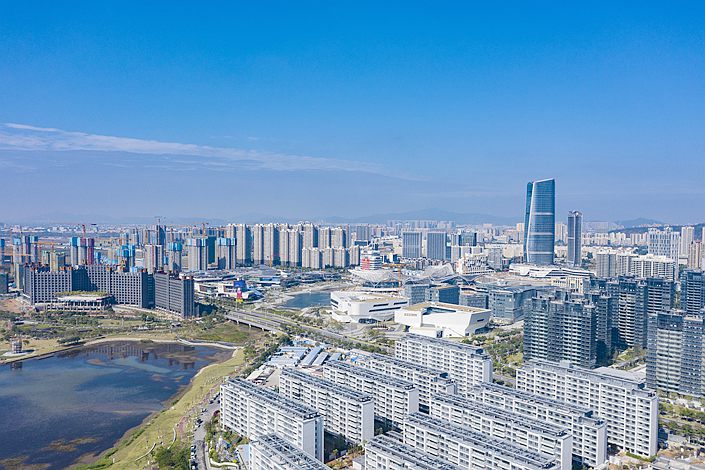
As highlighted in the Central Economic Work Conference (CEWC) and highlighted by the senior leadership recently, we expect the upcoming National People’s Congress (NPC) meeting starting from March 5 to reiterate the priority of stabilizing growth and call for more policy support to boost final demand and anchor expectations.
Despite the lingering downward pressures on growth, we think the government may still set an ambitious GDP growth target at “above 5%” or “5-5.5%”, and emphasize its target of new urban employment of over 11 million. Our baseline forecast of 5.4% growth in 2022 now faces more downside risk from a deeper than expected property downturn, more subdued consumption recovery, and/or softer external demand due to geopolitical risk.
Modest easing of property policies
The NPC meeting may continue to keep the “no speculation” framework for property policy setting while emphasize the sector’s healthy development. Property activities may have declined deeper year-on-year in Jan-Feb, despite recent policy easing, such as normalizing property related credit, relaxing developers access to presales funds, and more local governments easing local policy restrictions.
We think the meeting may send some signal of more policy easing, including allowing for more “differentiated” local property easing, such as lowering down-payment requirements, and possibly delaying a bit the implementation of property tax pilot scheme. Meanwhile, the government may accelerate construction of already planned 2.4 million units of public rental housing, which could help contribute one to two percentage points to overall property investment growth. We continue to expect property activities to improve sequentially and narrow year-on-year decline from the second quarter, leading to 10% to 12% decline in property sales and 5% decline in investment in 2022.
Stronger actual fiscal support amid stable headline deficit
Following the CEWC call for “more effective, accurate and sustainable” proactive fiscal policy, we expect the headline general budget deficit to stay largely unchanged at 3.1% to 3.2% of GDP (on accrual basis) and a stable new special local government bond financing of 3.6 to 3.7 trillion yuan (vs 3.65 trillion in 2021). In addition, the government plans to roll out more tax & fee cuts than 1.1 trillion yuan in 2021, mainly to support SMEs, social welfare, innovation and decarbonization.
Moreover, we expect infrastructure investment to rebound to 4% or higher in 2022 from -5% year-on-year in the second half of 2021, thanks to the government’s explicit call for “advancing” infrastructure investment, front-loading of special LG bond issuance in the first half of 2022, utilization of unspent fiscal funds from last, and modestly easing local government financing vehicle financing. Therefore, we expect the augmented fiscal deficit to expand by 0.5 percentage points in 2022 from an over three percentage points contraction in 2021.
More credit support, lower funding costs
We expect the NPC meeting to keep the tone of “prudent” monetary policy again but with explicit easing bias, including maintaining ample liquidity, increasing credit support, especially for SMEs, innovation and green development, and lowering actual funding cost. The NPC meeting may continue to set the credit and money growth “largely compatible with” nominal GDP growth, while we think China’s macro leverage is likely to increase by three percentage points in 2022 after a deleveraging by nine percentage points in 2021.
Looking forward, we expect more RRR cuts, no policy rate cut but lower actual funding cost (such as average bank lending rate). Credit growth (TSF excluding equity) may rebound further from 10.3% year-on-year in January to around 11% in mid-2022 before normalizing in late 2022, a swing partly driven by the front-loading of special local government bond issuance. Property related credit could see further modest easing (especially mortgages), while mortgage rates are likely to moderate a bit even without additional policy rate cut.
Easing overly tight Covid restrictions, more pragmatic push for energy control and decarbonization
We expect the NPC meeting to urge local governments abolishing excessive Covid restrictions to mitigate the negative impact of over-tightening measures on economic growth, especially consumption, service activities and SME business.
It is also our baseline assumption that China’s local Covid restrictions may be eased notably from the second quarter onwards, even the zero-Covid strategy stays intact. On the other hand, the NPC meeting may emphasize again a pragmatic push for decarbonization while reiterating its long-term commitment is unchanged. It means a gradual phasing-out and more efficient use of traditional energy, especially in light of elevated oil prices, continued push for new energy investment, and more pragmatic setting of near-term energy consumption goals. We see no significant power shortages and energy restrictions in 2022.
Downside risks to the economy from Covid uncertainties and geopolitical risk
Our baseline forecasts assume notable relaxation of Covid restrictions at local levels from the second quarter onwards. However, given the highly transmissive omicron variant is currently raging in Hong Kong and has a significant risk of spreading to the Chinese mainland, Covid restrictions may stay tight for longer or even tighten further. In which case, we could see more local lockdowns and restrictions of interregional travel and offline activities, leading to weaker consumption recovery, and hence, GDP growth. In addition, recent geopolitical events may jeopardize the ongoing global recovery, weaken China’s export demand, increase volatility of global energy prices and financial markets. The government may ease policy further to offset the additional downward pressure on growth, including easier monetary policy, stronger credit rebounding, more proactive fiscal spending, faster infrastructure investment and more property easing. Nevertheless, Covid uncertainties and recent geopolitical events mean more downside risks to China’s growth outlook.
Wang Tao is the head of Asia economics and chief China economist at UBS Investment Bank.
The views and opinions expressed in this opinion section are those of the authors and do not necessarily reflect the editorial positions of Caixin Media.
If you would like to write an opinion for Caixin Global, please send your ideas or finished opinions to our email: opinionen@caixin.com
Get our weekly free Must-Read newsletter.







